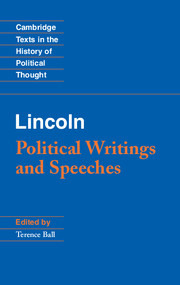Introduction
Published online by Cambridge University Press: 05 April 2013
Summary
Abraham Lincoln occupies a unique place in the American pantheon. Symbol, sage, myth, and martyr, he is an American icon and touchstone – Honest Abe and The Great Emancipator, a Janus-faced demigod sculpted in marble. But that is the post-assassination Lincoln. During his lifetime Lincoln elicited very different reactions. To the abolitionist agitator Wendell Phillips, he was “that slave-hound from Illinois.” To the abolitionist author and orator Frederick Douglass Lincoln was “preeminently the white man’s President, entirely devoted to the welfare of white men.” In the eyes of southern slave-holders and sympathizers Lincoln was a radical abolitionist turned tyrant, a view shared by John Wilkes Booth. “Sic semper tyrannis!” – thus always to tyrants – Booth shouted after shooting Lincoln.
My purpose here is to look at Lincoln as a political thinker. This is a more difficult task than might at first appear, for we cannot hope to understand Lincoln the thinker without understanding the constraints under which he thought and wrote and spoke. For Lincoln was, above all, a canny and shrewdly practical politician who had to win elections in order to accomplish anything at all. He was not an armchair philosopher who had the luxury of thinking and discoursing candidly (much less publicly) on the great moral and political issues of the day – slavery in particular. As president he steered a complex course between the shoals of radical abolitionism and pro-slavery secessionism, southern sympathizers in the North and border-state loyalists. He was more on the abolitionists’ side than they knew or acknowledged; but his actions were constrained by the Constitution, by his oath to uphold it, and by practical political necessity. If we are to understand Lincoln the political thinker, then we must put primary emphasis on the adjective “political,” for his thought is embedded in his actions and the justifications he offers in their defense.
- Type
- Chapter
- Information
- LincolnPolitical Writings and Speeches, pp. xv - xxxviiPublisher: Cambridge University PressPrint publication year: 2012



